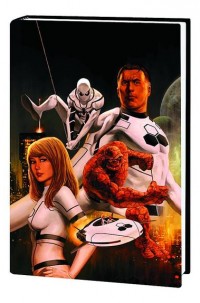FF BY JONATHAN HICKMAN PREM HC VOL 01 EPTING VAR
What did the
iFanboy
community think?
Pulls
Art by Steve Epting, Paul Mounts & Barry Kitson
Cover by Steve Epting
Size: 0 pages
Price: 19.99
Jonathan Hickman’s Fantastic Four run was always something that I’ve been meaning to get around to reading in trade form, since quite honestly, it seems to be the only way to do so if you want your money’s worth with the story. From the beginning, I’ve tried to delve into this run and quickly got turned off each time by simplistic stories that don’t seem to go anywhere and set pieces that are never acted upon. It dawned on me after reading this volume of FF, however, that the pace for this series just doesn’t translate well into a single issue format. As a long form novel type series where characters and actions are allowed to breathe, though? This series seems to sing.
I first began to suspect this while reading the “Three” arc. People were criticizing the series up to that point with accusations that no/very little story was being told. Jumping on occasionally to see what these people were talking about, I was inclined to agree. With “Three”, though, it seems that a good chunk of those huge loose ends from previous Hickman runs were used to weave a great story that was full of tension and excitement. With the first volume of FF, the cycle is beginning anew. Picking up from the first Hickman storyline involving the alternate reality Reed Richards, a new mega-arc is starting to blossom out of issues that are seemingly dull, but are in fact setting up set pieces for a grand conclusion. The main focus of this volume are the antics of a group of alter-Reeds who have angered the gods of their respective universes by playing God themselves. Their plan to save their own hides, unfortunately, is at the expense of the “real” world. Thus, they start a chess game to play various factions against each other to come out ahead and create a machine that will save them and decimate the “real” one. A cool threat and a basis for a neat story, don’t get me wrong. It’s just that Hickman has a style of writing in which he will introduce a cool concept (like the league of Reed’s worst enemies to take down the alternate Reed’s) in order to have that be a factor in the story, but won’t really utilize that concept until its time for the grand finale. That’s ok, I guess. Elmore Leonard does something similar in his novels.
It’s just that I can’t imagine reading the single issues of this series and being entertained. In fact, the end of this volume happens smack dab in the middle of a story that had a slow-but-steady momentum going for it. It was a bit jarring, and I can’t really seem to judge the story as a whole until I read the continuation. I mean it SEEMS to be going in a great direction, but since the main focus of this volume was to be a beginning, I’ll have to reserve the final judgement of the story until I read the whole thing.
Hickman’s scripts seem to be only as good as their endings. However, judging by “Three”, they’re pretty fantastic. I liked the beginning of the new phase of his Fantastic Four run, but I’m sure that I’ll enjoy the story more when it reaches its conclusion.
Art: 4 - Very Good




Great review.
I agree with your ratings. I generally find Hickman’s FF stuff to be around a 3.5, sometimes better, sometimes worse. It’s full of a lot of great ideas that I feel awed to read about. But on the other hand, like you said, often the issues seem like “simplistic stories that don’t seem to go anywhere and set pieces that are never acted upon”. Err, actually, they usually are acted upon, but often in a delayed and anti-climactic fashion. Or in a fashion full of sound and fury signifying much less than was promised. There’s often a disjuncture between the uniqueness of Hickman’s ideas and his ability to execute them within a dynamic plot. This is just his style of writing, though. It’s who he is as a writer. There are advantages and disadvantages to his style.
It is good stuff overall, though, and reading more of it makes it all seem better. When it was first coming out, I just couldn’t get excited enough about the basic concepts. A council of Reed Richardses? Okay, that’s a neat idea, but Hickman didn’t really do enough with it to warrant the kind of hype it got. Even the action sequences felt a little hollow or something. The second arc, with all the silent panels and the tablet info-dumps at the end of each issue? It was cool, but, again, there wasn’t enough meaningful content for me to say it was great. Not as great as some people were saying, praised that seemed in large part based on how impressed they were by seeing a tablet screen on the last page of four issues. But the thing is, when you read enough of the run, you start to take everything in as a whole and stop analyzing each one of Hickman’s somewhat empty set pieces in and of itself. Maybe the set pieces in and of themselves are enough for some people, but they weren’t enough for me. Thankfully, all of it does seem more cohesive, content-filled and “deeper” in a sense once you’ve read about a dozen issues in a row. Or read collected editions of it, I guess.
The only aspect of the single issues that you might miss out on is the letters page. It was pretty good sometimes.